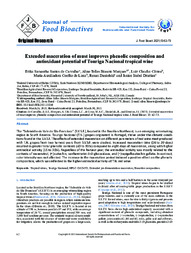Extended maceration of must improves phenolic composition and antioxidant potential of Touriga Nacional tropical wine.
Extended maceration of must improves phenolic composition and antioxidant potential of Touriga Nacional tropical wine.
Author(s): CARVALHO, E. S. S. de; BIASOTO, A. C. T.; CORREA, L. C.; LIMA, M. A. C. de; DANIELSKI, R.; DRUZIAN, J. I.
Summary: The Submédio do Vale do São Francisco (S.V.S.F.), located in the Brazilian Northeast, is an emerging winemaking region in South America. Touriga Nacional (T.N.) grapes originated in Portugal, thrive under the climatic conditions found in the S.V.S.F. The effects of extended maceration on different parameters of red wine must produced with T.N. grapes from two harvest years from S.V.S.F. were studied. Increased maceration time (16 to 20 days) resulted in greater total phenolic contents (40 to 85%) compared to eight days of maceration, along with higher antiradical activity (15 to 36%). Regardless of the harvest year, the antiradical activity was mostly related to the contents of resveratrol, (+)-catechin, isorhamnetin-3-O-glucosidase, and (?)-epigallocatechin gallate. In contrast, color intensity was not affected. The increase in the maceration period induced a positive effect on the phenolic composition, which was reflected in the higher antiradical activity of T.N. red wine.
Publication year: 2021
Types of publication: Journal article
Unit: Embrapa Semi-arid Region
Observation
Some of Embrapa's publications are published as ePub files. To read them, use or download one of the following free software options to your computer or mobile device. Android: Google Play Books; IOS: iBooks; Windows and Linux: Calibre.
Access other publications
Access the Agricultural Research Database (BDPA) to consult Embrapa's full library collection and records.
Visit Embrapa Bookstore to purchase books and other publications sold by Embrapa.

